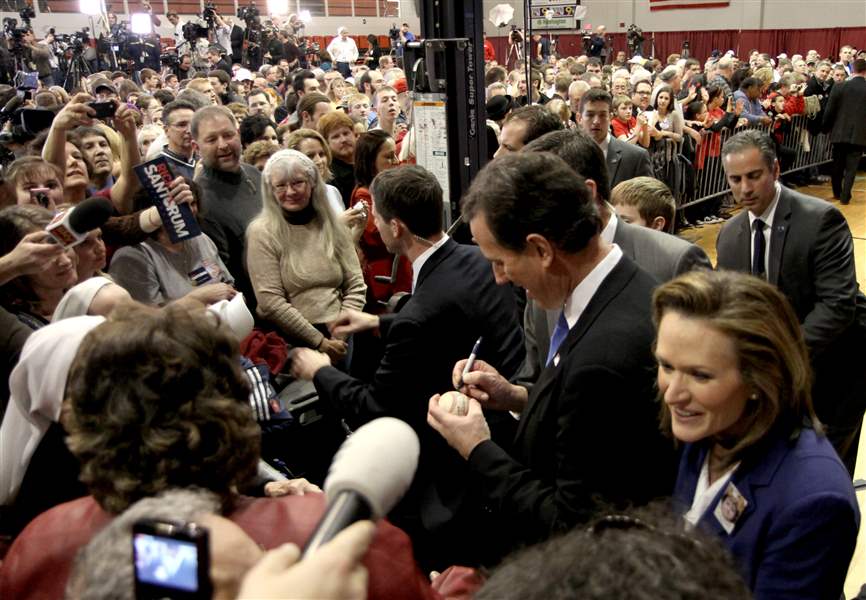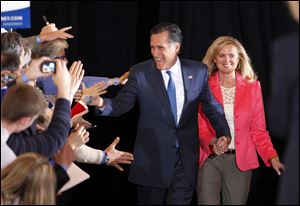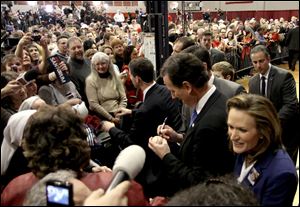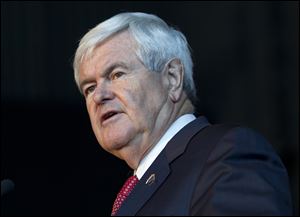
Mitt Romeny takes Ohio in GOP race
Santorum falls short, but snags 3 other states
3/7/2012
Rick Santorum signs a baseball after speaking at an election-night party at Steubenville High School in eastern Ohio, near the West Virginia and Pennsylvania state lines.
BLOCK NEWS ALLIANCE/ANDREW RUSH

Former Massachusetts Gov. Mitt Romney and his wife, Ann, greet supporters as they arrive at their Super Tuesday rally in Boston. Mr. Romney placed first in the GOP primary in the critical battleground state of Ohio.
COLUMBUS — In a nail-biter, Mitt Romney barely snatched the critical battleground state of Ohio away from main rival Rick Santorum on Super Tuesday.
Early this morning the Associated Press and CNN called the Ohio contest for Mr. Romney.
The former Massachusetts governor’s narrow victory, plus Mr. Santorum’s failure to field a full slate of delegates in the Buckeye State, means Mr. Romney won the bragging rights of the popular vote and a majority of the 63 delegates Ohio awarded on Tuesday.
To get the GOP presidential nomination, the winner must surpass 1,144 delegates.
Mr. Romney was doing some delegate counting in Boston. Speaking before Ohio, the biggest political prize of the night, had been called, Mr. Romney focused on jobs, taxes, and government regulation.
“For those who look around at jobs they can’t get and bills that they can’t pay, I have a message,” Mr. Romney said. “You have not failed. You have a president who failed you, and that’s going to change…
“You are not forgotten,” he said. “We will not leave you behind. Our campaign is on the move, and real change is finally on the way. These times may be tough, but our citizens still believe in the promise of America, and they deserve a president who believes in them.”
RELATED CONTENT
Northwest Ohio election coverage
Mr. Santorum took the stage in Steubenville less than two hours after the polls closed.
“We’re going to win a few,” he said. “We’re going to lose a few. But as of right now, we’re going to get at least a couple of gold medals and a whole passel full of silver medals. We can add to Iowa, Missouri, Minnesota, Colorado, and now Oklahoma and Tennessee. We have won in the West, the Midwest, and the South, and we’re ready to win across the country.”
His strong second-place finish still guarantees Mr. Santorum will not walk away from Ohio empty-handed since the state, like nearly all the Super Tuesday states, awards at least some of its delegates proportionally.

Rick Santorum signs a baseball after speaking at an election-night party at Steubenville High School in eastern Ohio, near the West Virginia and Pennsylvania state lines.
With 96.1percent of the unofficial vote reported to the Ohio Secretary of State’s office, Mr. Romney led with 37.9 percent. Mr. Santorum was close on his heels with 37.1 percent. Newt Gingrich followed with 14.6 percent, and Ron Paul with 9.2 percent.
Mr. Romney’s strength was largely in urban areas while Mr. Santorum was winning the rural areas of the state.
But in Lucas County, Mr. Santorum narrowly edged Mr. Romney by a margin of 335 votes. Mr. Santorum earned 37.8 percent, Mr. Romney 36.6 percent, Ron Paul 12.7 percent, and Newt Gingrich 12 percent.
This Romney comeback scenario has played out before. The “anti-Romney” of the moment — Newt Gingrich in Florida and Mr. Santorum last week in Michigan — held substantial leads in polls until the final days before the election when ads financed by Mr. Romney’s campaign and an unaffiliated super political action committee supporting him filled the airwaves and shifted the momentum.
But despite dramatically outspending Mr. Santorum, he barely edged Mr. Santorum in the popular vote.
“Governor Romney’s great resources — money and his connections with these states with office holders and leaders — have allowed him to come from behind, as he did in Michigan, his native state,” said John Green, director of the University of Akron’s Ray C. Bliss Institute of Applied Politics.
“In polls, he caught up in Ohio, when a week ago, Sen. Santorum had a seven to 11-point lead,” he said. “He certainly closed the gap. He has the resources, and he’s been able to apply those resources effectively.”
President Obama was unopposed on the Democratic ballot.
Mr. Romney also won Massachusetts where he served as governor, neighboring Vermont, Idaho, and Virginia. Mr. Romney faced only Mr. Paul in Virginia because Mr. Santorum and Mr. Gingrich failed to qualify for the ballot.
Mr. Santorum won the evangelical states of Oklahoma and Tennessee and the caucus state of North Dakota while former House Speaker Gingrich easily won the state that elected him to Congress, Georgia. At 76, Georgia was the biggest delegate prize at stake on Super Tuesday.

“I believe that I am the one candidate who has the ability to debate Barack Obama decisively…,” Mr. Gingrich told supporters in Atlanta. “And let me be straight, I don’t believe the Romney technique of outspending your opponent four or five to one with negative ads will work against Barack Obama because there’s no possibility that any Republican is going to out raise the incumbent president of the United States.”
Results were unavailable for the caucus state of Alaska, where Mr. Paul concentrated much of his efforts.
Although he walks out of Ohio with delegates after holding his election watch party in Steubenville, Mr. Santorum’s lack of early campaign organization in the race hurt him here. He failed to field any delegates in three congressional districts, including the 9th stretching along Lake Erie between Toledo and Cleveland, costing him nine delegates off the bat.
He also did not field a full slate of delegates in other districts, including the rural and conservative 4th District stretching from Shelby County to Lorain County, which he won Tuesday. He had just one delegate in that district.
That left him with a beginning deficit of as many as 18 delegates in all out of 48 awarded based on the results of each congressional district. The newly elected Ohio Republican Party State Committee, once it is seated, will ultimately decide who will receive any unallocated delegates.
Neither Mr. Gingrich nor Mr. Paul will share in any Ohio delegates, failing to win a congressional district or surpassing the threshold of 20 percent that would allow them to share in the 15 delegates to be distributed based on the popular vote. Three Republican National Committee delegates from Ohio are not tied to Tuesday’s results.
A total of 419 delegates were up for grabs on Super Tuesday as Mr. Romney sought to solidify himself as the inevitable nominee. Mr. Santorum looked to Ohio to prove he could go toe to toe with Mr. Romney for the 1,144 delegates needed to avoid a brokered convention in Tampa in August.
While Georgia controls more GOP delegates, most attention has gone to Ohio with the second-largest delegate prize because of the close two-man race here and the bellwether state’s reputation as a presidential kingmaker.
With his strong performance Tuesday and his scant victory in Ohio, can Mr. Romney now call the conservative faithful to his campaign?

Republican presidential candidate, former House Speaker Newt Gingrich speaks at the U.S. Space and Rocket Center, Tuesday in Huntsville, Ala. He captured his home state of Georgia, his first win since South Carolina.
Mr. Santorum has warned on the campaign trail that conservatives will not trust Mr. Romney or rally around him. But the former Pennsylvania senator who has held himself up as the only real conservative in this race has also said that he personally will vote for the GOP nominee in November, whoever he is.
Mr. Green said he suspects that will be true for most conservatives in the end.
“Many conservatives dislike President Obama intensely. That may very well bring conservatives behind whoever the nominee is, whether he’s their first choice. They may not be 100 percent happy, but they will end up rallying around Mitt Romney because the alternative in their view is much, much worse,” he said.
So the battle goes on to states like Alabama and Mississippi which will hold primaries next week. Kansas will hold caucuses Saturday.
Ohio Secretary of State Jon Husted said voting was light both on Election Day and with absentee and early voting in the 35 days preceding it.
At least anecdotally, he said there was little evidence that previously registered Democrats were choosing to cast Republican ballots in an effort to meddle with the GOP presidential primary.
“Frankly, looking at the results today, it’s been hard to get people who are registered with their own political party to get out to vote,” he said. “It doesn’t look like there’s been an impact in any way of people doing party switching and trying to impact the election.”
In Ohio, voters can choose to cast a ballot of another party, but in the process they become officially registered as a member of that party.
Staff writer Tony Cook contributed to this report.
Contact Jim Provance at:
jprovance@theblade.com,
or 614-221-0496.